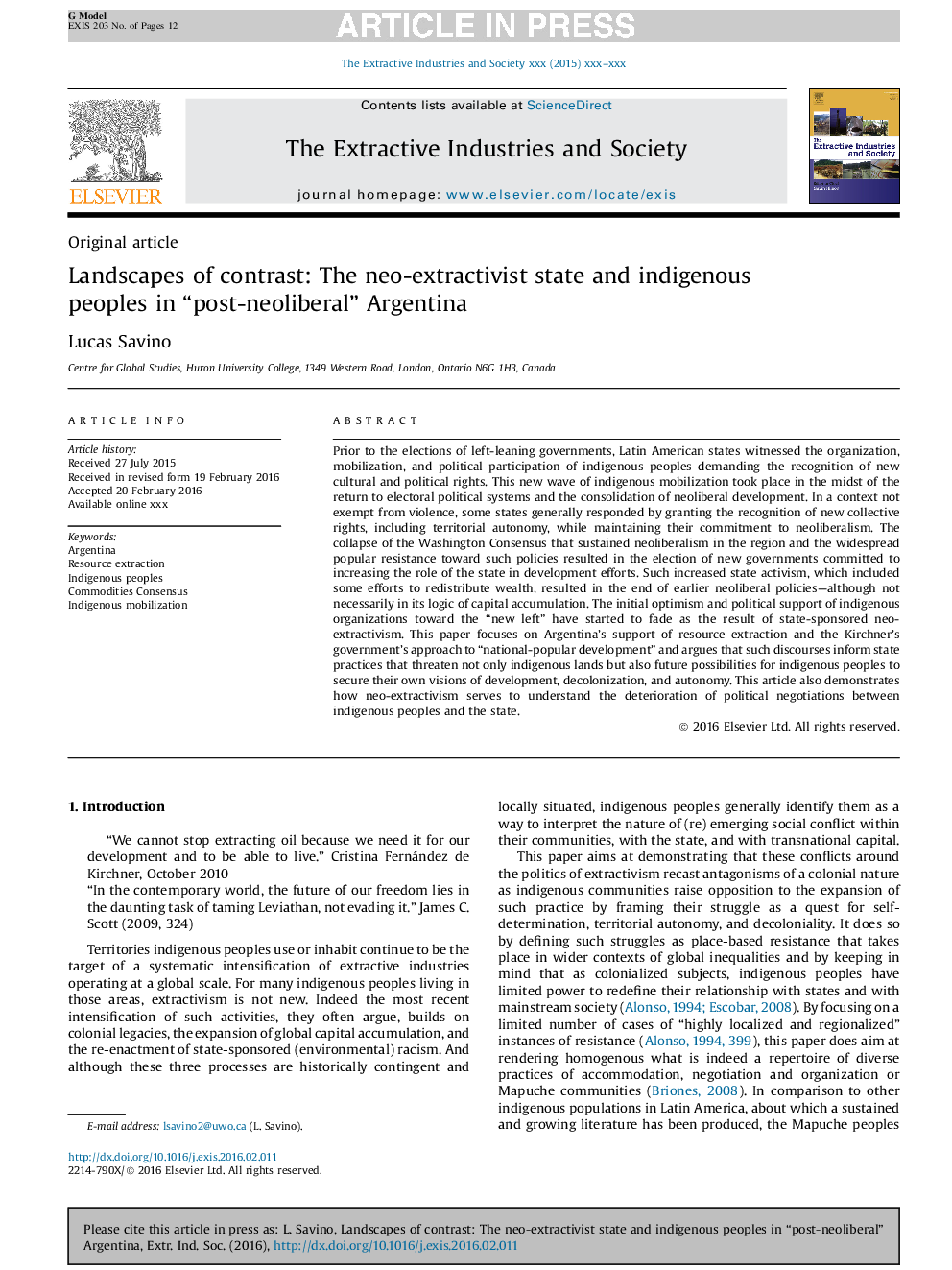| کد مقاله | کد نشریه | سال انتشار | مقاله انگلیسی | نسخه تمام متن |
|---|---|---|---|---|
| 10502224 | 945260 | 2016 | 12 صفحه PDF | دانلود رایگان |
عنوان انگلیسی مقاله ISI
Landscapes of contrast: The neo-extractivist state and indigenous peoples in “post-neoliberal” Argentina
ترجمه فارسی عنوان
مناظر کنتراست: دولت نئو کشف و مردم بومی در پست نئولیبرال ؟؟ آرژانتین
دانلود مقاله + سفارش ترجمه
دانلود مقاله ISI انگلیسی
رایگان برای ایرانیان
کلمات کلیدی
آرژانتین، استخراج منابع، مردم بومی، توافق کالاها، بسیج بومی،
ترجمه چکیده
پیش از انتخابات دولت های چپ، دولت های آمریکای لاتین شاهد سازماندهی، بسیج و مشارکت سیاسی مردم بومی بودند که خواستار شناخت حقوق جدید فرهنگی و سیاسی شدند. این موج جدید بسیج بومی در اوج بازگشت به سیستم سیاسی انتخابات و تثبیت توسعه نئولیبرالی صورت گرفت. در یک زمینه که خشونت را معاف نمی کند، بعضی از ایالت ها به طور کلی با اعطای به رسمیت شناختن حقوق جمعی جدید، از جمله خودمختاری حقیقی، با حفظ تعهد خود به نئولیبرالیسم پاسخ می دهند. سقوط توافق واشنگتن که نئولیبرالیسم را در منطقه ادامه داد و مقاومت گسترده مردم در برابر این سیاست ها، منجر به انتخاب دولت های جدید شد که متعهد به افزایش نقش دولت در تلاش های توسعه بودند. چنین فعالیت های فعال دولتی که شامل برخی تلاش ها برای توزیع ثروت بود، منجر به پایان سیاست های پیشین نئولیبرالی شد، گرچه لزوما در منطق انباشت سرمایه نبود. خوشبینی اولیه و حمایت سیاسی از سازمان های بومی در زمینه حقوق جدید؟ به عنوان نتیجه نئو کشف گرایی تحت حمایت دولت آغاز شده است. این مقاله بر حمایت آرژانتین از استخراج منابع و رویکرد دولت کرچنر به توسعه ملی ملی متمرکز است. و استدلال می کند که چنین گفتوگوها به شیوه های دولتی که نه تنها زمین های بومی را تهدید می کنند، بلکه فرصت های آینده را برای مردم بومی برای تهیه دیدگاه های خود برای توسعه، تقسیم بندی و استقلال به رسمیت می شناسند. این مقاله همچنین نشان می دهد که چگونگی نابودی نژاد به منظور درک زحمت مذاکرات سیاسی میان مردم بومی و دولت، نشان می دهد.
موضوعات مرتبط
علوم زیستی و بیوفناوری
علوم محیط زیست
مدیریت، نظارت، سیاست و حقوق
چکیده انگلیسی
Prior to the elections of left-leaning governments, Latin American states witnessed the organization, mobilization, and political participation of indigenous peoples demanding the recognition of new cultural and political rights. This new wave of indigenous mobilization took place in the midst of the return to electoral political systems and the consolidation of neoliberal development. In a context not exempt from violence, some states generally responded by granting the recognition of new collective rights, including territorial autonomy, while maintaining their commitment to neoliberalism. The collapse of the Washington Consensus that sustained neoliberalism in the region and the widespread popular resistance toward such policies resulted in the election of new governments committed to increasing the role of the state in development efforts. Such increased state activism, which included some efforts to redistribute wealth, resulted in the end of earlier neoliberal policies-although not necessarily in its logic of capital accumulation. The initial optimism and political support of indigenous organizations toward the “new left” have started to fade as the result of state-sponsored neo-extractivism. This paper focuses on Argentina's support of resource extraction and the Kirchner's government's approach to “national-popular development” and argues that such discourses inform state practices that threaten not only indigenous lands but also future possibilities for indigenous peoples to secure their own visions of development, decolonization, and autonomy. This article also demonstrates how neo-extractivism serves to understand the deterioration of political negotiations between indigenous peoples and the state.
ناشر
Database: Elsevier - ScienceDirect (ساینس دایرکت)
Journal: The Extractive Industries and Society - Volume 3, Issue 2, April 2016, Pages 404-415
Journal: The Extractive Industries and Society - Volume 3, Issue 2, April 2016, Pages 404-415
نویسندگان
Lucas Savino,
